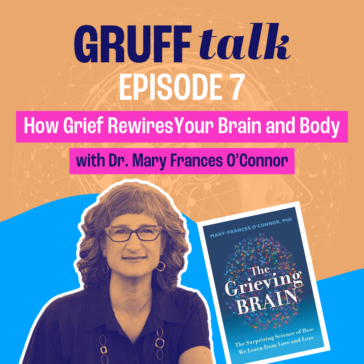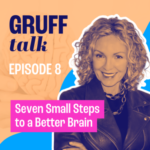Listen to the conversation here.
In this episode of GRUFFtalk, I had an amazing conversation with Dr. Mary-Frances O’Connor, who is an associate professor of psychology at the University of Arizona. Her focus is on the physical and emotional responses we experience in grief, yearning, and isolation. Dr. O’Connor is also the author of The Grieving Brain: The Science of How We Learn From Love and Loss.
Grieving the loss of a loved one is a process people seldomly bring up. It’s uncomfortable, painful, and terribly personal. When my mother passed away in July 2021, I was left trying to hold all the pieces but my body seemed to be falling apart.
A friend shared with me that although grief never goes away, it does get softer. After an overwhelming response to a social media post about grieving the loss of my mother, I wanted to better understand how grief affects our minds, bodies, and lives.
Dr. O’Connor heads the Grief, Loss, and Social Stress Lab at the University of Arizona and literally wrote the book on how grieving impacts the brain. She shares her expert opinions and research on how we can better process the feelings and the trajectory of grief, not just for ourselves but also for others.
Having Dr. O’Connor answer some of the more challenging questions we have around grief helped put loss, yearning, and that feeling of emptiness into perspective for life to go on.
Here are a few of the questions we discussed.
To listen to the entire conversation, click here.
How is the experience of grief different from that of grieving? Breaking down the simplicity of these two very similar words, which many of us may use interchangeably was really eye-opening. ‘Grief’ is a noun, and the experience of grief is like a wave that comes over you. It’s also something that never quite goes away. Grief can stay with you for months and years. ‘Grieving’, on the other hand, is a verb and it changes over time. You may still be grieving the loss of a loved one many years later, but the intensity of that grief changes and hopefully lessens over time.
What changes are happening in the brain when you experience grief? Another big question Dr. O’Connor breaks down and helps us with is understanding how the brain processes grief. As Dr. O’Connor puts it, “there’s love first before there can be grief,” which brings to light the emotions rooted in grief. Our brains are trying to make sense of the loss and it’s a struggle to process when your brain is disoriented and yearning to see the person you’ve lost again.
Sadly, many of us are never told how to go through the grieving process.. Losing someone you love is more than their absence. It’s a loss of identity, of habits, routines, and traditions that affect you emotionally and physically. I think this episode is an excellent start for those of us who don’t feel prepared to grieve and feel at a loss on how to comfort someone through their grieving process.
3 Inspirational takeaways from Dr. Mary-Frances O’Connor:
- Grief is different from grieving, the two are not the same.
- Grieving is a form of learning how to make life meaningful now.
- Prioritize your self care and check in with your healthcare provider.
Be encouraged that we are resilient and capable of grieving, hopefully this gives you the understanding you need to deal with the complicated nature of grieving. – Dr. Mary-France O’Connor
Connect with Dr. O’Connor
Connect with Barbara:
Love Your Age: The Small-Step Solution to a Better, Longer, Happier Life
Barbara Hannah Grufferman website
Instagram @Barbara Hannah Grufferman
Facebook @BarbaraHannahGruffermanAuthor
































































